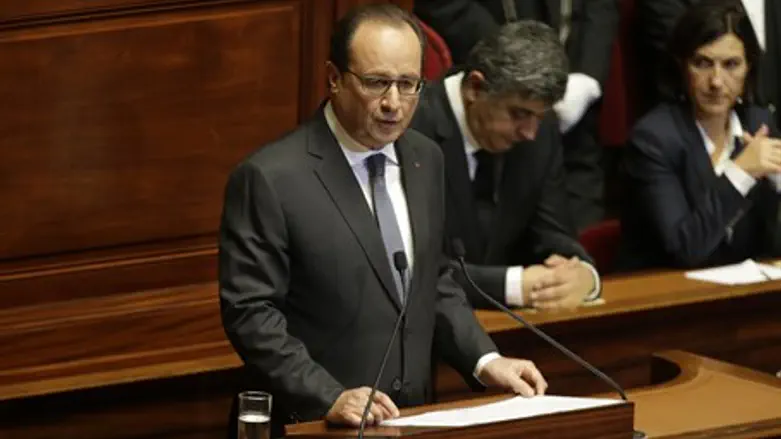
French leader Francois Hollande has donned the cloak of war chief after the Paris carnage, but has come under fire from the right-wing opposition for wasting time since attacks in January.
A semblance of political unity after the devastating Islamic State (ISIS) attacks on Friday night which left 129 dead has quickly unraveled in a marked shift in the mood seen after attacks on Charlie Hebdo magazine and a Jewish supermarket 10 months ago.
Then, the Socialist leader led a march in Paris of over a million people including politicians from across the spectrum, saying "unity is our best weapon" after the murder of 17 people in a three-day Muslim terror assault.
This time the opposition quickly tore into Hollande for his failure to act strongly earlier, accusing him of only now taking decisions that many on the right have long demanded.
With the nation stupefied by the scale of the carnage, Hollande declared "war on terrorism," stepped up air raids on Islamic State jihadists in Syria and tightened security at home.
"He talks about war, he talks about waging war. There is a clear shift to the right," said Philippe Marliere, a professor in French politics at University College London.
"This is a president who was ridiculed with this nickname 'marshmallow' for being undecided, indecisive, who seems to now be fully at ease in his new clothes of chief of the army."
Hollande has urged a global fightback against ISIS which claimed the attack, making moves towards a military rapprochement with international pariah Russia in Syria.
"Too much time wasted"
In the days after the attacks by three teams of gunmen and suicide bombers, Hollande and his government also pushed for more border controls, thousands more jobs in the security forces and possible house arrest for French citizens returning from Syria.
Under a state of emergency, which lawmakers voted on Thursday to extend for three months, police will be allowed to carry weapons when not on duty and Hollande also wants to change the constitution to make it easier for the government to make decisions in a time of crisis.
At a joint session of parliament on Monday, Hollande suggested stripping citizenship from convicted jihadists born in France who hold a second passport, dumbfounding the political right which saw its proposition to do so rejected by parliament in April.
Both the right and far-right praised the new measures, with a lawmaker for former president Nicolas Sarkozy's The Republicans (LR) party accusing him of "going shopping among our propositions."
But while on Monday both houses of parliament stood to sing a moving rendition of the "Marseillaise" anthem, the show of national unity quickly showed strain.
A day later Prime Minister Manuel Valls was booed in a rowdy session in the National Assembly as he asked "patriots to come together to combat terrorism."
"It's too late," shouted a lawmaker with Sarkozy's party from the benches.
The government has been forced to defend itself against security failings as it emerged that known jihadists had launched a massive and sophisticated operation under the noses of intelligence agents.
"How many victims must there be before we use the word (failings)? Were all the implications considered after the January attacks? The answer is no," Sarkozy told Le Monde newspaper.
"Too much time was wasted," said Sarkozy, who is hoping to take another run at the presidency in 2017 polls. "Nor did the government draw all the right conclusions about the impact of our military intervention in Syria on internal security."
Marine Le Pen of the far-right National Front (FN) has said Hollande's measures were "picked from the saddlebag of the FN."
She said Hollande's government "should have resigned" after the attacks.
Civil liberty restrictions
The analyst Marliere said that after the "facade" of national unity, parties were "trying to score political points," which was harder in January when Hollande - the most unpopular president in French history - saw his star rise in the polls.
Friday's attacks came just weeks before key regional elections, in which Hollande's Socialists had already been expected to face defeat against the Republicans, with Le Pen's far-right likely to reap more gains.
Marliere claimed there is a danger in Hollande's hardline response to the attacks at a time when traumatized citizens are likely to approve of any such measures to defend their lives, and any disapproving leftists are too weak to make their voices heard.
"The restriction of civil liberties is very serious because once the threat has gone away those restrictions tend to stay," he said. "There is very little room for reflection about what happened, about possible failures of intelligence."
"Hollande doesn't have to be pushed to the right by the right - he has put himself very much on the right," claimed the analyst.
AFP contributed to this report.